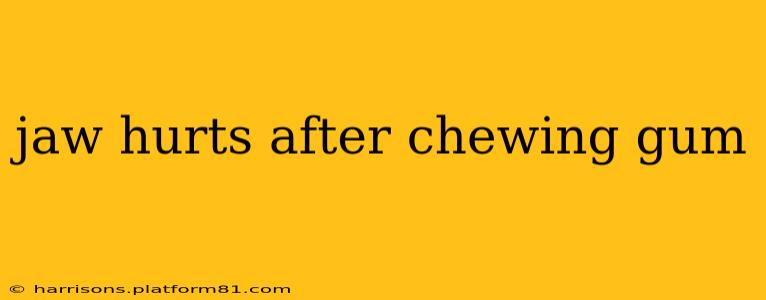Chewing gum, a seemingly innocuous habit, can sometimes lead to jaw pain. This discomfort can range from a mild ache to a sharp, debilitating pain, significantly impacting daily life. Understanding the underlying causes is crucial for effective management and prevention. This comprehensive guide explores the reasons why your jaw might hurt after chewing gum, offers remedies for immediate relief, and provides preventative measures to avoid future discomfort.
Why Does My Jaw Hurt After Chewing Gum?
Several factors contribute to jaw pain after chewing gum. Let's delve into the most common culprits:
Temporomandibular Joint (TMJ) Disorders
The temporomandibular joint (TMJ) connects your jaw to your skull. TMJ disorders are a common cause of jaw pain, and excessive chewing, like prolonged gum chewing, can exacerbate existing conditions or trigger new ones. Symptoms can include pain in the jaw, temples, or ears, clicking or popping sounds in the jaw, and difficulty opening or closing your mouth.
Muscle Strain and Fatigue
Repeatedly chewing gum, particularly aggressively or for extended periods, can strain the muscles involved in jaw movement. This strain can manifest as pain, stiffness, or tenderness in the jaw muscles, particularly the masseter muscles located in the cheek area.
Bruxism (Teeth Grinding)
While not directly related to gum chewing, bruxism (teeth grinding or clenching) often accompanies gum chewing. The repetitive action can worsen existing bruxism, leading to increased jaw muscle tension and subsequent pain. Gum chewing can trigger or intensify this unconscious habit.
Dental Problems
Underlying dental issues like misaligned teeth, cavities, or impacted wisdom teeth can contribute to jaw pain. Gum chewing can exacerbate these problems, leading to increased discomfort.
Myofascial Pain Syndrome
This condition involves the fascia, the connective tissue surrounding muscles. Persistent gum chewing can create trigger points in the jaw muscles, resulting in widespread pain that can radiate to other areas of the face and head.
Stress and Anxiety
Stress and anxiety often lead to unconscious clenching or grinding of the teeth, including during activities like gum chewing. This unconscious behavior can contribute to jaw muscle fatigue and pain.
What Can I Do If My Jaw Hurts After Chewing Gum?
Addressing jaw pain promptly is crucial to prevent it from becoming chronic. Here are some effective remedies:
Rest Your Jaw
Avoid chewing gum or any strenuous jaw movements for a while. Allow your jaw muscles to recover and reduce the strain.
Apply Heat or Ice
Applying a warm compress or ice pack to the affected area can provide temporary relief. Experiment to see which works better for you.
Over-the-Counter Pain Relief
Nonsteroidal anti-inflammatory drugs (NSAIDs) like ibuprofen or naproxen can help reduce pain and inflammation. Always follow the recommended dosage.
Gentle Stretching and Massage
Gently stretching and massaging your jaw muscles can help relieve tension and improve mobility. Consult a physical therapist for guidance on appropriate exercises.
How Can I Prevent Jaw Pain From Chewing Gum?
Prevention is key. Here are some practical strategies:
Chew Gum in Moderation
Avoid excessive gum chewing. Limit the duration and frequency of chewing sessions.
Chew Slowly and Gently
Chew gum slowly and deliberately, avoiding aggressive chewing that puts excessive strain on your jaw.
Choose Sugar-Free Gum
Sugar-free gum is generally preferred as it reduces the risk of dental problems that can contribute to jaw pain.
Maintain Good Oral Hygiene
Regular brushing, flossing, and dental checkups are essential for preventing dental issues that may impact your jaw.
Manage Stress
Practicing stress-reducing techniques like meditation, yoga, or deep breathing can help prevent unconscious jaw clenching.
Consult a Dentist or Doctor
If jaw pain persists despite home remedies, consult a dentist or doctor to rule out underlying medical conditions. They may recommend further investigations or treatment, such as splints or physical therapy.
By understanding the causes of jaw pain after chewing gum and implementing these preventative measures and remedies, you can effectively manage this discomfort and enjoy chewing gum without the pain. Remember that seeking professional advice is crucial if the pain is persistent or severe.
